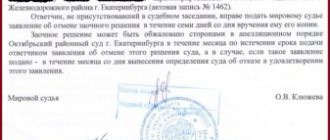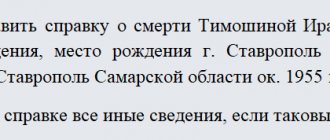According to Russian legislation, the registry office is authorized not only to enter into marriages, but also to dissolve marital relations in some of the simplest cases. One of the grounds allowed by law for starting the divorce procedure through the registry office arises when the following 2 facts are simultaneously present:
- Absence of at least one common child under 18 years of age. What does the phrase “common child” mean? This phrase refers to a minor for whom both persons who are in a legally registered and, accordingly, official marital relationship act as parents. Thus, if a baby is related by blood to one spouse or was adopted by only one spouse, then he cannot be considered common.
- Husband and wife agree to end the marriage.
However, the state civil registry office can begin divorce proceedings not only upon the application of both marriage partners, but also in exceptional cases upon a unilateral application, even if there are children under 18 years of age. Such cases include:
- Incapacity of the marital partner. Please note that it must be confirmed by the court, and this confirmation must be issued in the form of a court decision.
- The unknown absence of another marriage partner. It is also confirmed and formalized in the form of a court decision.
- Criminal punishment for the marriage partner, which is a term of imprisonment of at least 3 years, which he or she must spend in prison.
Divorce procedure through the registry office
Mutual agreement
First of all, it is necessary to determine the state civil registry office, which has the right to register the termination of marriage. Family law distinguishes 2 types of civil registry offices that have the right to divorce a wife and husband:
- The one who officiated the wedding.
- Those that are located in the place of registration of one or both marriage partners. For example, if the wife is registered in Kazan, and the husband is registered in Nizhny Novgorod, then the spouses can divorce both in Kazan and Nizhny Novgorod at their choice.
Having decided on the registry office, the next step is to prepare the documents required for the divorce procedure:
- Passports of each spouse.
- Certificate of entry into marital relations.
- Joint statement. The sample can be downloaded from here.
- A document proving payment of the required amount for state duty. These could be bank receipts; printed checks generated as a result of paying the state fee with electronic money or via Internet banking.
Next, you should choose the most convenient and least expensive way to submit the collected papers for consideration. Currently, three such methods are possible. The features of each of them are described in detail in the table.
| Methods for submitting documents | A comment |
| Visiting the registry office in person | The transfer of documents and a joint application to the civil registry office must take place in the presence of both marriage partners. It is prohibited to send a representative in your place. If for some reason one spouse cannot be present at the document submission procedure, you must proceed as follows:
|
| State Services Portal | Keep in mind that the opportunity to send a divorce application is available only to those persons who are authorized on the portal and have an enhanced electronic signature. To initiate a divorce procedure, you need to follow a number of simple steps:
|
| Multifunctional center (MFC) | The procedure is the same as for a personal visit to the civil registry office. |

The registry office grants a divorce only after 1 month has passed from the date of delivery of the divorce documents, and only in the presence of at least one marriage partner. The absence of both spouses means that they are not interested in divorce, and, therefore, the registry office has the right to terminate the procedure for ending the marriage.
The divorce is formalized by making an appropriate note in the register of vital records in the presence of the marriage partners and issuing them divorce certificates.
Unilateral statement
First of all, it is necessary to determine the state civil registry office, which has the right to register the termination of marriage. Family law distinguishes 2 types of civil registry offices that have the right to divorce a wife and husband:
- The one who officiated the wedding.
- Those that are located in the place of registration of one or both marriage partners.
Having decided on the registry office, the next step is to prepare the documents required for the divorce procedure:
- Marriage certificate.
- Applicant's passport.
- Grounds for termination of marital relations. This role is played by the original of the relevant court decision, recording the unknown absence of the second spouse or his incapacity, or the original of the sentence of criminal conviction.
- Statement. The sample can be downloaded from here.
- A document proving payment of the required amount for state duty. These could be bank receipts; printed checks generated as a result of paying the state fee with electronic money or via Internet banking.

The law provides the only way to initiate a divorce in the case of a unilateral expression of the will of the spouse. Only personal transfer of documents is allowed. Thus, it is impossible to start a divorce from home through the State Services website or using the MFC in this case.
After accepting the necessary papers, the state registry office will set a time for the dissolution of the marriage relationship. As a rule, this time cannot occur earlier than 1 month from the date of transfer of the required documents. In addition, the registry office does not have the right to conduct a divorce procedure and enter information about a divorced marriage into the register book without the personal presence of the applicant during this action. Upon completion, the ex-spouse is issued a divorce certificate against signature.
How to divorce a foreigner?
If a foreigner and a Russian citizen are in a legal marital relationship, then the procedure that they will have to go through during the divorce depends on the country in which they want to get a divorce. Possible solutions to this problem are listed in the table.
| Country of divorce | Where and how to get divorced |
| RF | Divorce procedures are handled by the registry office or the court. The law they apply is only Russian. |
| Foreign country |
|
Divorce through the registry office
The first case is possible only in certain situations:
- The husband was sentenced to more than three years in prison. Then the court verdict is attached to the package of documents.
- The spouse is incapacitated. In this case, it is necessary to submit a document recognizing it as such to the registry office.
- The husband has gone missing. Then the applicant needs to have a copy of the court decision recognizing the second spouse as untimely absent.
Obtaining this document is possible if there is no data on the citizen’s whereabouts for more than 1 year. To do this, you need to file an application with the court.
The following are attached to the application:
- A copy of the application;
- a document confirming the plaintiff’s interest in obtaining an opinion;
- state payment receipt duties;
- certificate of registration or temporary registration of the missing person;
- documents confirming the application to the police and search activities;
- other evidence of a missing person in any form permitted by law.
In what cases can you not file for divorce?
| A person with limited right to divorce | A comment |
| Husband | The law identifies two cases in which restrictions apply to the husband:
|
| Both spouses | The application and the accompanying package of documents were transferred to the state civil registry office, which does not have the legal right to begin the procedure for ending the marriage. The following registry offices do not have this right:
|
Which registry office should I apply to?
Experts recommend contacting the registry office where the spouses registered their marriage. This department contains all the necessary documents about the husband and wife, so the divorce process will be carried out without problems and in the shortest possible time.
If one of the spouses has moved to another city, then the interested party must contact the registry office at the place of residence, especially if the person has a serious illness or, due to some other reason, cannot go to another city. But if you wish, you can visit the registry office at the address where your spouse is located.
It is also possible to contact the registry office at the current address of residence of the spouses, if they are still together.
In addition to personally contacting the institution, you can send an application for divorce through the government services web portal. If it’s a long way to get to the registry office, you can contact the MFC.
The divorce process is carried out in the presence of both spouses, even if they live in different cities. In such a case, one of the spouses can confirm their consent to dissolve the marital union by sending an application to the registry office (it will first need to be certified by an employee of a notary agency). He also has the right to contact the MFC to establish his identity and write an application.
What to do if your spouse doesn’t show up

However, a marriage partner who refuses to prepare a joint application for the registry office and come there with personal documents in order to initiate divorce proceedings prevents the second spouse from exercising his family rights. The Family Code identifies such behavior as evasion of divorce and allows the spouse, whose rights are violated by the evading partner, to dissolve the family relationship through the court.
According to Russian law, a divorce from a evader spouse can be dealt with by 2 courts.
| Courts | Affairs |
| Magistrate's Court |
|
| District Court | Divorces involving the division of assets of marital partners valued at more than 50,000 rubles. |
Claim documents are sent to the court, which is located in the city of residence of the defendant, in most cases in accordance with the rules of jurisdiction. An exception to this rule is that the plaintiff, if he has documented evidence of a serious illness (cancer, tuberculosis, heart failure), can submit documents to the court of his city or district.
In the application sent to the court, you must write:
- Court details (name, index, location address).
- Details of the parties (full name, postcode and registration address, contact information).
- Information about the marriage (where and when it was concluded, as well as with whom).
- Brief information about children, if any.
- The reason that prompted you to seek legal assistance. Here you need to indicate that the spouse is avoiding divorce, for example, he does not want to write a joint statement to the state registry office.
- Other requirements related to the main requirement for divorce, for example, for the division of an apartment, cottage, furniture, car or household appliances. If desired, the wife and husband can draw up a property agreement or prenuptial agreement before the divorce.
- Legislative acts and articles that serve as justification for claims.
- A complete list of requirements, as well as a list of supporting documents and evidence.
- Date of writing, painting.

If at the meeting the defendant confirms that he was only avoiding the divorce, but not against him, then the court has the right to divorce the marriage partners in one meeting. This is possible only on the condition that the plaintiff or the other party does not make claims to the division of the family’s property assets.
Once the court decision is recognized as legal and valid, the spouses become free from marital responsibilities. Each of them will need to come to the civil registry office with a passport, a court extract, a check for state fees, an application and a marriage certificate. A certificate confirming the divorce will be issued on the same day.
Divorce through court
In all other cases, divorce is possible only by court decision. Article 154 of the Code of Civil Procedure of the Russian Federation establishes maximum deadlines for consideration and resolution of applications in court. Up to 2 months in a district court, up to 1 month in a magistrate judge. Jurisdiction is determined by the value of the property. Termination of marital relations in court is regulated by articles 21-24 of the Family Code.
When filing a claim, the applicant must accompany it with the following set of documents:
- A copy of this application.
- Marriage certificate.
- A document confirming payment of the state fee.
Read: Description of the complete process of divorce through the court.
The application reflects information about the spouses (full name, passport numbers, place of residence), certificate number and date of marriage, date of actual termination of marital life. The text of the application itself is drawn up in free form. The main requirement is the content of the request for divorce and the reasons for the divorce. To write it, form No. 10 is used.
Basic principles of property division
The division of marital assets can be done in three ways:
- Marriage contract.
- Property Agreement.
- A court decision based on the norms of the Family Code.
Their legal features are indicated in the table.
| Methods for dividing marital property | Legal regulation and features |
| Marriage contract (sample here) |
|
| Agreement (sample here) |
|
| Judgment |
|
The following assets acquired during a marital relationship and registered in the name of either spouse are recognized as common property:

Real estate. This includes houses, land, apartments.- Royalties paid for intellectual works or inventions.
- Earnings from business, salaries, benefits, any type of financial assistance, pensions.
- Deposits.
- Ownership of shares in various legal entities.
- Bills and shares.
- Movable things.
- Jewelry.
- Investment income.
- Luxurious things (fur coats, expensive cutlery, antiques).
- Bonds.
The law recognizes as personal belongings:
- Personal property (things necessary for practicing the chosen profession and generating income from it; clothing; cosmetics; shoes).
- Inherited property.
- Assets received or purchased before marriage.
- Items that were given or received free of charge during the marriage.
List of documents for filing a claim

It includes:
- Marriage certificate.
- Copy of the passport.
- Proof of payment of the fee, such as a bank receipt.
- Evidence of the spouse’s evasion of divorce through the state registry office (correspondence by e-mail or instant messenger, audio or video recordings, witness statements).
- Inventory of marital assets during their division.
- Appraiser's report.
- Property agreement or marriage contract.
- Power of attorney from a representative.
What documents, in addition to the application, are important to provide to the registry office?
The divorce process also involves filing the following package of papers:
- Confirmation of the fact of marriage.
- Passport or passports. Depending on whether the application is submitted jointly or by one party.
- The court's decision. In the cases listed above, as an exception. For example, the incapacity of a husband or wife.
Prerequisite for submitting an application
In order to send documents, you need to pay a state fee. If the application is written jointly, the state fee is paid by each party, and in other situations - by the applicant.
When will a marriage be considered dissolved?
After 30 days, the parties will be able to obtain a divorce, but provided that the entire package of documents has been collected, the fee has been paid, and the application has been completed correctly.
When can you get married again?
Only with a divorce certificate can a new relationship be legalized.
Arbitrage practice

The case was considered by the Kambarsky District Court of the Udmurt Republic in August 2021.
The requirements stated in the statement of claim by the wife were as follows:
- End official relations with your husband.
- Divide the common property 50/50 and give her a third of the apartment, half of the garage and half of the car.
The plaintiff's reasoning was as follows:
- She wanted to get a divorce at the state registry office, and her husband, who verbally agreed with the end of the marriage, in fact did nothing, because the marriage did not interfere with him in any way.
- There is no family household at the time of the court hearing; she does not want to reconcile and live again with her husband in the same territory.
- They did not enter into a marriage contract or property agreement.
The husband, in turn, stated that he has no objections to separating from his wife, but does not agree with her claims regarding the property described in the lawsuit, so he asks the judge to deny his wife these demands.
Having examined the arguments and written documents presented by the parties, the judge made the following decisions:
- Since the husband agrees with the request of the wife asking for a divorce, the court, taking into account the mutual will of the parties, grants a divorce to the marriage partners.
- The court is obliged to take into account the following fact: property assets acquired by marriage partners after the actual termination of joint housekeeping and cohabitation, but while still married, cannot be common. As shown by the testimony of the parties and documents provided by the spouses, the car and apartment were purchased by the defendant during the separation of the marital partners. Consequently, this property cannot be divided, since it is not common.
- As for the garage, it was purchased when the wife and husband were still running a common household and living together. For this reason, the court considers the garage a joint asset that must be divided 50/50.
Regulatory framework
| Name of laws | List of articles used |
| Tax Code (Part 2) | Article 333.19 is a complete list of court fees. Article 333.26 is a complete list of fees for the registry office. |
| Civil Procedure Code | Article 23 is a list of cases dealt with by the magistrate. Article 132 – list of document attachments to the claim. |
| Family code | Article 17 – prohibition on ending a marriage. Article 19 – grounds for divorce through the state registry office. Article 21 – grounds for divorce through the court. Chapter 7 - regulation of the regime of joint marital property. Chapter 8 – regulation of marital property under a marriage contract. |
| Federal Law “On Acts of Civil Status” | Article 33 – termination of official relations between spouses by mutual agreement (procedure). Article 34 – termination of official relations between spouses by unilateral expression of will (procedure). |









